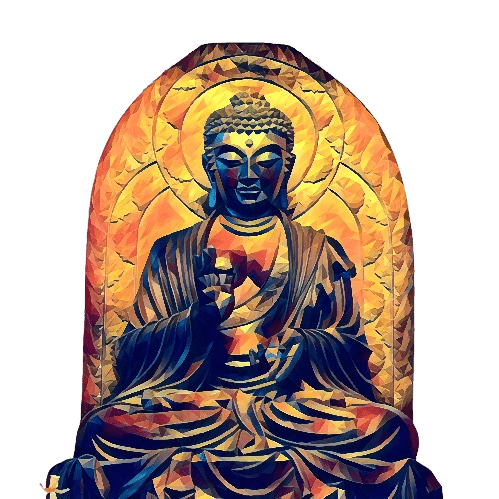How To Live: Answers to Mankind's Oldest Question
This article is about answering the question "How to live?". It is not about how to vialives - we humans have become pretty good at that. What we still struggle with as a species, however, is filling our lives with meaning, and as a result, many feel lost or even suffer from anxiety and depression. So how should we live?
Philosophers have been asking this question for thousands of years, and some of them have even come up with some pretty good answers. In this article, we'll take a look at the various philosophical schools such as Stoicism, Buddhism, Existentialism, Taoism, and Confucianism to see what they've come up with.
Although all of these schools share some core principles and insights, each has a unique way of looking at things. By understanding them, we may be able to find our own way to live a fulfilling life.
So let's get started!
How to live: The stoic way
The Stoic philosophers were among the earliest to develop a comprehensive system of thought for a good life. According to them, the key to a good life is to act virtuously at all costs and not to betray oneself or one's principles. But also an enormously important aspect of Stoicism is learning to deal constructively with negative emotions.

Marcus Aurelius is also called "the prince of stoicism".
It is therefore not surprising that there are quite a few famous quotes from this fascinating man.
And many of them are still relevant today. Or perhaps more relevant than ever.
The Stoics believed that negative emotions are caused by our false beliefs about the world. When we learn to correct these beliefs, we can manage negative emotions.
What false beliefs are these supposed to be? Well, here you have a few examples:
- Marcus Aurelius, Roman emperor at the time, was extremely privileged, but he was not immune to strokes of fate. He was always aware that bad things could happen to him, instead of being under the illusion that power and influence would protect him.. Thus, the death of several of his children did not catch him unprepared. The following quote gives more insight into his thinking:
"When you kiss your son goodnight, Epictetus says, you whisper to yourself, "He may be dead in the morning." Don't tempt fate, you say. By talking about a natural event? Do you tempt fate by speaking of the harvest of grain?"
Marcus Aurelius
- Another example of a false belief would be the perception that material or financial loss is a tragedy.. To claim that such a loss is a false conviction may seem audacious to you. But there is historical evidence from Stoics that illustrates just that.
Zeno of Kition, for example, came from an enormously wealthy merchant family, but when he came to Athens he had nothing. According to historical lore, he had "suffered shipwreck." It is not entirely clear whether this caused him to lose his wealth, or whether this was already the case beforehand, but it is certain: if this loss had not occurred, Zeno would probably never have founded Stoicism.
- The last example that I would like to list here for you: Revenge and retaliation are wrong. Chances are, this example is the easiest one to follow. That's because it's preached a lot. Nevertheless, most of us find it difficult to refrain from revenge and retaliation, because we often feel that the other person deserves something bad for his actions.
"Revenge is an admission of pain: a mind bent by injury is not a great mind."
Seneca
In all three examples, the point is not to blindly push away one's emotions and feelings, but to understand and control them.
Thus, one of the most important things the Stoics taught was the importance of self-control. They believed that we should never allow our emotions to control us. Instead, we should always try to act in accordance with reason.
The Stoics also believed in the importance of living in harmony with others. They believed that man is by nature a social being and that we should strive to cooperate with others rather than compete with them.
According to the Stoics, if we can learn to control our emotions, think clearly, and cooperate with others, we will be able to live a good life.
If you're looking for beginner-friendly literature on Stoicism, we have a full article sharing our top tips! The 7 Best Books for Stoicism Beginners
How to Live: The Buddhist Way
Buddhism is another philosophical tradition that offers a comprehensive system of thought on how to live a good life. According to the Buddha, the key to a good life is to let go of our attachment to things that are beyond our control.

If you are wondering who and how Buddha really was, this article will answer all your questions.
The Buddha taught that all our suffering is caused by our attachments to things we cannot control, such as our body, our thoughts, and the outside world. If we can learn to let go of these attachments, we can eliminate our suffering.
One of the most important things Buddha taught was the importance of mindfulness. He said that we should always be aware of our thoughts and emotions and that we should never allow them to control us. Instead, we should try to act in accordance with our values.
The Buddha also believed in the importance of living in harmony with others. He believed that human beings are inherently social beings and that we should strive to cooperate with others rather than compete with them.
If we learn to let go of our attachments, be mindful of our thoughts and feelings, and cooperate with others, the Buddha believed, we will be able to live a good life.
As you have probably correctly noticed, these are already some parallels to stoicism. And we will find them also in most of the following philosophies.
Nevertheless, Buddhism is also a very own philosophy, which can offer an enormous fascination especially for western people. An exciting example of this is "The Four Noble Truths", which are among the best-known teachings of the Buddha. They state that life is full of suffering, that suffering is caused by our desires, that we can end our suffering by giving up our desires, and that there is a path (the Eightfold Path) that leads to the end of suffering.
Want to start reading about Buddhism? We'll help you find the right place to start: The 4 best books for Buddhism beginners
How to Live: The Existentialist Way
Unfortunately, existentialism is often misunderstood and seen as somewhat daunting. I must admit that this was the case for me as well, until I decided to put my prejudices aside and delve into this fairly new philosophical school (if you want to learn more about why it is misunderstood, is this article for you).
Existentialism is a philosophical tradition that emphasizes the importance of living in accordance with one's values and beliefs. According to the existentialists, the key to a good life is to find our own meaning and purpose in life.

Fyodor Dostoevsky was another great existentialist writer. He was born in Russia in 1821 and is best known for his novels Crime and Punishment, The Idiot, Demons, and Brothers Karamazov.
But he is also known for bringing to life the existential themes of freedom, choice and responsibility.
He also belongs to the existentialists who believed in God.
Existentialists believe that there is no single meaning or purpose to life. Instead, each individual must create his or her own meaning and purpose. This can be done by living in accordance with our own values and beliefs.
Existentialists also believe that we should never let our feelings rule us. Instead, we should always try to act in accordance with our values.
Finally, the existentialists believed in the importance of living in harmony with others. They believed that human beings are by nature social creatures and that we should strive to cooperate with others rather than compete with them.
When we are able to find our own meaning and purpose in life, act in accordance with our values, and cooperate with others, existentialists believe we can live a good life.
How to live: The Taoist way
Taoism (or Daoism) is an ancient philosophical tradition that emphasizes the importance of living in harmony with the natural world, and is still relevant today (as we discuss in this article Taoism: Still Relevant Today - How It Can Improve Your Life). It originated in today's China. According to the Taoists, the key to a good life is to live in harmony with the flow of the natural world.
Taoists believe that the natural world is governed by a set of principles known as the Tao. If we can learn to live in harmony with the Tao, we can eliminate our suffering.

It is based on the legendary book Tao Te Ching (The Way and Its Power) attributed to Lao Tzu, a semi-mythological figure who is said to have been a wealthy government official who became disillusioned with politics and decided to live as a hermit in the countryside.
You can read more about this fascinating figure in our countless articles about his teachings - like here:
Taoists believe that the natural world is governed by a set of principles known as the Tao. If we can learn to live in harmony with the Tao, we can eliminate our suffering. Since the Tao seems to be a rather abstract concept - especially for Westerners - you should check out this article to understand it better.
One of the most important things the Taoists taught was the importance of living in harmony with nature. They believed that human beings are part of the natural world and that we should strive to live in harmony with it rather than trying to control it.
The Taoists also believed in the importance of living in harmony with others. They believed that human beings are social creatures by nature and that we should strive to cooperate with others rather than compete with them.
If we can learn to live in harmony with the natural world, act in accordance with our values, and cooperate with others, the Taoists believed, we will be able to live a good life.
If you're interested in this school of thought, we're sharing our best books for beginners: The 5 best books for Daoism beginners
How to Live: The Confucian Way
Confucianism is a philosophical tradition that emphasizes the importance of living in accordance with social norms. According to Confucians, the key to a good life is to live in accordance with the expectations of family, friends, and community.
The Confucians believed that human beings are by nature social creatures and that we should strive to maintain harmonious relationships with others. They believed that this is best accomplished when we live in harmony with the expectations of our family, friends, and community.

Confucius was the most famous Confucian philosopher - I mean, what should we expect when this philosophical school is named after him?
Born in 551 BC, he was a teacher and politician who developed a set of ethical principles that became the basis of Confucianism.
His most famous teachings are contained in the Analects, a collection of his sayings and dialogues compiled by his disciples after his death.
Did you know that Confucius was also a very talented musician? He is said to have invented the 25-string zither.
The Confucians also believed that it is important to live in accordance with our own values. They believed that we should never be guided by our feelings. Instead, we should always try to act in accordance with our values.
Finally, the Confucians believed in the importance of living in harmony with the natural world. They believed that human beings are part of the natural world and that we should strive to live in harmony with it rather than trying to control it.
If we can learn to maintain harmonious relationships with others, act in accordance with our values, and live in harmony with the natural world, then, the Confucians believed, we will be able to live a good life.
Want some beginner-friendly book recommendations? We've got them: The best Confucianism books for beginners
How to live: The absurdist way
Absurdism is a philosophical tradition that emphasizes the importance of living in accordance with one's values. According to absurdists, the key to a good life is to act in accordance with our values, even if that means going against the expectations of our family, friends, and community.
Absurdists believe that human beings are social creatures by nature, but they also believe that we should never let our emotions rule us. Instead, we should always try to act in accordance with our values.

Albert Camus was a French philosopher, author, and journalist. Camus is best known for his novels The Stranger and The Plague, and his philosophical essay The Myth of Sisyphus.
During World War II, Camus joined the French Resistance and was awarded the Nobel Prize for Literature in 1957.
Camus' main interest was the question of whether life is worth living, and he believed that the only way to answer this question was to live in accordance with one's values.
Absurdists also believed in the importance of living in harmony with the natural world. They believed that human beings are part of the natural world and that we should strive to live in harmony with it rather than trying to control it.
If we can learn to act in accordance with our values and live in harmony with the natural world, the absurdists believed, we will be able to live a good life.
So what sounds like a good life to you?
There is no one-size-fits-all answer, but the good news is: you don't have to commit to one philosophy and stick with it for the rest of your life.
Certainly, it is more tempting for some people to choose one and stay with it. And this approach is a good one. Especially because you get a much better and deeper understanding of its teachings.
Seneca (hello Stoicism fans) even warned against jumping too often and too much between schools of thought. On the other hand, he also said that he himself occasionally sneaks into "the camps of the enemies" - though he added that he doesn't do this to defect, but rather like a scout looking for useful information that he can use.
Want to read more about Seneca? How about taking a look at this article? Quotes Explained: Seneca on Multitasking and FOMO
Hopefully, this will give you a better overview of some of the options available to you. Each philosophical tradition has its own unique insights, and each can offer you a different perspective on your life.
So take some time to explore the different traditions and find out which one appeals to you the most. Then start incorporating some of the ideas into your own life. You'll be surprised how much they can help you live a good life.
If you don't know where to start, we have a complete article on how to begin your philosophical journey as a beginner: The Best Philosophies for Beginners (All You Need to Know)







